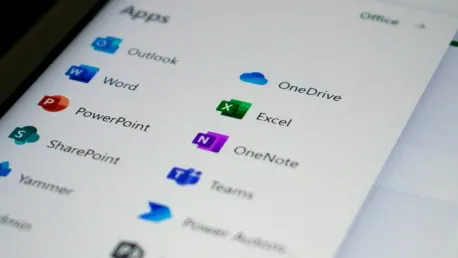How Can Businesses Secure Microsoft 365 Amid Rising Cyberattacks?
The alarming surge in cyberattacks targeting Microsoft 365 domains has made it imperative for businesses to adopt advanced cybersecurity measures to protect their data. According to IT services company N-able, there has been a dramatic rise in hacking activities aimed specifically at Microsoft 365 in 2024, with a 56% increase in disaster recovery events and a significant rise in backups among N-able’s partners. The trend highlights vulnerabilities in IT companies and individual users, with Microsoft’s 365 service customers bearing the brunt. The Critical Start’s Cyber Research Unit (CRU) reported a staggering 3,400 cyber alerts in the first half of 2024, marking a 46.15% increase compared to the previous year. Businesses are grappling with increasingly sophisticated cyber threats, necessitating robust, ransomware-resilient backup architectures to safeguard their data.
Identifying the Major Threats to Microsoft 365
The increasing number of cyber threats specifically targeting Microsoft 365 domains underscores the critical importance of understanding and identifying the major threats businesses are facing. Ransomware, in particular, is a growing concern highlighted by experts such as Chris Groot, General Manager of Cove Data Protection at N-able. Ransomware attacks are becoming more sophisticated, often using known backup file extensions to infiltrate systems and demanding hefty ransoms to release data. Such attacks not only result in data loss but also disrupt operations and create significant financial burdens for businesses. To mitigate these risks, companies need to ensure they are backing up their data regularly and adopt a proactive approach to identifying and addressing security vulnerabilities.
Another major threat is accidental data deletion and insider threats, which are often underestimated but can be equally devastating. Employees may unintentionally delete critical data, and disgruntled insiders might deliberately compromise systems. These internal threats necessitate comprehensive user training programs and stringent access controls that limit data manipulation capabilities to authorized personnel only. Cybercriminal organizations are continually evolving, and their ability to exploit even the most basic backup systems requires businesses and MSPs to stay ahead with cutting-edge security measures and rigorous monitoring protocols.
Strategies for Enhancing Data Protection
One of the key strategies for enhancing data protection is implementing a ransomware-resilient backup architecture. Ransomware attacks often target backup files, making it crucial for businesses to use advanced backup solutions that encrypt data both at rest and in transit. This ensures that even if cybercriminals infiltrate the system, the data remains secure and inaccessible without the proper decryption keys. Regular backups should be scheduled, and businesses must test these backups periodically to ensure data can be recovered quickly in the event of an attack. As noted by N-able’s report, the volume of backed-up data among MSPs increased to 42 petabytes in 2024 from 26 petabytes in 2023, reflecting a growing awareness and adoption of robust backup strategies.
Additionally, implementing multi-factor authentication (MFA) adds an extra layer of security for accessing sensitive data within Microsoft 365. MFA requires users to provide multiple forms of verification, making it significantly more difficult for unauthorized individuals to gain access. Businesses should also utilize advanced threat protection tools that monitor and analyze network traffic for any suspicious activities and immediately isolate and mitigate potential threats. Employing such comprehensive security measures can significantly reduce the risk of successful cyberattacks and ensure the integrity and availability of critical business data.
The Role of Managed Service Providers (MSPs)
Managed Service Providers (MSPs) play a pivotal role in helping businesses secure their Microsoft 365 environments amid the rising tide of cyberattacks. MSPs provide expertise and resources that many organizations may lack in-house, offering tailored security solutions that address specific threats and vulnerabilities. According to N-able’s findings, there was a substantial increase in the number of MSPs providing backup services for Microsoft 365 in 2024, with an additional 1,000 MSPs coming on board year-over-year. This growing reliance on MSPs underscores their importance in the broader cybersecurity ecosystem, providing continuous monitoring, threat detection, and rapid response capabilities.
MSPs can also assist businesses in developing comprehensive data protection strategies that include regular security assessments, vulnerability testing, and compliance with regulatory standards. By partnering with MSPs, businesses can benefit from advanced technologies and best practices that ensure robust protection against cyber threats. Simon Beckett, Director of DynaCom IT Support Ltd., emphasizes the critical priority of protecting Microsoft 365 data, highlighting ransomware as one of the foremost concerns. With their extensive knowledge and experience, MSPs are well-equipped to help businesses navigate the complex landscape of cybersecurity, enabling them to focus on their core operations while maintaining a secure and resilient IT environment.
Conclusion
Enhancing data protection is crucial, and one effective strategy is adopting a ransomware-resilient backup system. Ransomware frequently targets backup files, so businesses need advanced solutions that encrypt data both while stored and in transit. This ensures that even if cybercriminals breach the system, the data remains secure and unreadable without decryption keys. Regularly scheduled backups are vital, and businesses should periodically test them to ensure rapid data recovery if attacked. N-able’s report noted that the volume of backed-up data among MSPs rose to 42 petabytes in 2024 from 26 petabytes in 2023, demonstrating a growing awareness and implementation of strong backup practices.
Moreover, implementing multi-factor authentication (MFA) enhances security for accessing sensitive data within Microsoft 365. MFA requires multiple verification methods, making unauthorized access much harder. Advanced threat protection tools are also essential, as they monitor and analyze network traffic for suspicious activity, isolating and mitigating threats immediately. By employing such thorough security measures, businesses can greatly reduce the risk of successful cyberattacks, ensuring the integrity and availability of critical data.









